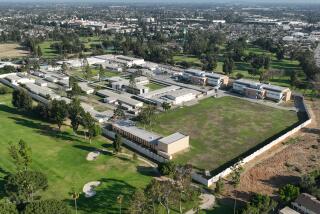Teens in Shelter ‘Like Zombies,’ Report Charges
- Share via
Nearly one in three teen-agers at MacLaren Children Center, the county’s sole shelter for abused and neglected children, are given tranquilizers or other psychotropic drugs instead of counseling and are “walking around like zombies,” according to the author of a report that will be sent to the Board of Supervisors on Monday.
Mental health officials immediately branded the allegations as inaccurate, misleading and in the words of one psychiatrist, “totally off the wall.”
The report’s author, Sandra Serrano Sewell, said in an interview Tuesday that youngsters at MacLaren are being “overmedicated” by inexperienced mental health workers seeking to treat emotional problems and control disruptive behavior among the increasingly troubled population at the El Monte facility.
“The staff relies on pills when what these kids need is someone with expertise just talking to them,” she said.
Sewell, who is the administrator of two child care centers, chaired a committee that compiled the report for the county Commission for Children’s Services. She said she and fellow commissioners were “concerned” but not surprised to learn that 30% of older children at MacLaren are on psychotropic drugs.
‘They’re Out of It’
“We’ve been seeing these kids looking like they’re out of it,” Sewell said. “Kids are walking around like zombies. Just talking to them, you can see they are so zonked. . . . My feeling was they were on legal or illegal drugs; it was just a matter of finding out which.”
However, officials in the departments of mental health and health services said Sewell’s contentions are “factually wrong” and “naive.”
Dr. Charles Baker, medical director of Juvenile Court health services, said more youngsters at MacLaren are receiving medication because increasing numbers of troubled children are winding up there after being rejected by other facilities and because many of them are being diagnosed and treated for the first time.
The Department of Mental Health assumed responsibility last year for expanded psychiatric services at MacLaren. The child psychiatrist in charge of those services, Dr. Michael Malkin, said that as of last week, 47 of the 260 children at MacLaren--or one in every 5.5--were receiving psychotropic medication for conditions ranging from seizure disorders and hyperactivity to schizophrenia, severe depression, including suicidal behavior, and other psychoses.
Malkin said that 24 of the 130 residents over 12 years old--or about one in five--are receiving such medication. “Counseling is provided,” he said. “Medication is not used in lieu of but in addition to other treatment. Counseling is not even possible unless the child is able to focus and concentrate and deal with reality.
“This woman’s charges are totally off the wall. We get an equal number of complaints that kids aren’t on medication and should be. My bias is that we should avoid the medication with the kids when possible.” He complained that the commission had not voiced its concerns or asked for any explanation during regular meetings with him and other members of the staff at MacLaren.
Malkin explained that MacLaren is supposed to be a temporary shelter, not a treatment center. “There is confusion over its mission. The idea should be that kids should get out of here as quickly as possible, not be kept here for months for treatment. The children’s commission has a bias that it ought to be a treatment facility.”
At present, MacLaren employs one full-time psychiatrist, four part-time psychiatrists, two psychologists, 10 clinical social workers and a licensed psychiatric technician.
Dr. Doris Soghor, acting deputy director for youth services in the Department of Mental Health, said no child is placed on medication without a psychiatric and medical evaluation, that prescriptions are reviewed every two weeks and that a new policy requiring a judge’s consent for all medications for children under county jurisdiction is being implemented.
Plans Outlined
In addition, the state recently allocated $1.5 million for the development of mental health treatment programs for MacLaren children, including 95 beds at outside facilities for those requiring intensive treatment. The county also plans to open a 50-bed “sub-acute” facility for 50 teen-agers near County-USC Medical Center in October.
But Sewell said that she doubts the Department of Mental Health’s “commitment” to treating MacLaren’s disturbed children, and argued that the very fact that they are sent there signifies that they have already suffered trauma and that all of them should be psychologically assessed.
“But each is not getting a mental health assessment,” she said. “Then they act out and are sent to mental health (workers) and get medication. I say let’s deal with each as soon as he walks in the door.”
More to Read
Sign up for Essential California
The most important California stories and recommendations in your inbox every morning.
You may occasionally receive promotional content from the Los Angeles Times.













